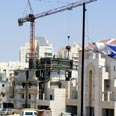
Ma'aleh Adumim. Building and extending
Photo: AFP
The Labor Party's official election platform includes the following surprising line: "(We support) significant budget cuts to isolated settlement areas only, not with regard to large settlement blocs."
That is to say, the Labor Party has decided to support further building in the territories, but "only" in large settlement blocs.
Seems reasonable enough: The Palestinians have signaled their official and unofficial agreement to the principle of territorial swap and reconciled themselves to large settlement blocs, reasonably close to the green line and home to the majority of settlers.
But in fact, building in these areas would be a mistake. After we spend and build, we will find all of a sudden that we, ourselves, have prevented any possibility of a permanent status agreement and a two-state solution, and that these blocs will constitute a reason to continue the conflict.
The borders of these blocs have never been defined. The security fence, being built unilaterally by Israel, establishes them de facto.
The "Ariel bloc," for example, extends over a wide area, reaching the heart of the West Bank and includes more than 15 settlements, from Ariel in the east (some 20 kilometers from the green line!) to Kedumim in the north, to Ma'aleh Shomron in the east and Ofarim and Beit Aryeh in the south.
Forming a wedge
It is clear that such a bloc will prevent minimal territorial contiguity for a future Palestinian state. This is also the reason the United States will not allow Israel to include this bloc on the Israeli side of the fence.
This is also true of the Ma'aleh Adumim bloc, which forms a wedge that cuts the West Bank in two, north and south.
Furthermore, it isolates east Jerusalem from the rest of the West bank.
This bloc includes the E-1 program to build 3,500 housing units between Ma'aleh Adumim and Jerusalem, intended to isolate east Jerusalem.
The Palestinians cannot agree to any arrangement that denies them a capital in east Jerusalem. Cutting off the city from the West Bank with settlement blocs (both those currently under construction and those in the planning stages) would be the nails in the coffin for any chance for peace.
In the event that there is no peace agreement, there will be no legitimacy for settlements, nor for settlement blocs. Even if Israel pulls back unilaterally from the rest of the area with no agreement, the Palestinians will view the blocs as a reason to continue the struggle, and the blocs could come under constant terror.
The rest of the world, too, cannot recognize Israeli sovereignty over the settlement blocs without the Palestinians' agreement and a permanent status agreement, and the settlements in question could well face the same fate as those in Gaza and the northern West Bank.
Furthermore, the Road Map peace plan, officially Kadima's election platform, explicitly states that Israel must stop building in the settlements in the first stage (including "natural growth" construction.)
Israel is mainly building apartments today in the settlement blocs (5,300 in 2005, according to the Central Bureau of Statistics). Israel cannot say it has fulfilled its requirements while demanding the Palestinians fulfill theirs.
Palestinian moderates should be strengthened
One of the strongest criticisms from the Palestinians of the peace initiatives such as the Geneva Initiative was that by unofficially accepting settlement blocs, Palestinian negotiators gave legitimacy to Israel's continued building program in the settlements.
Hamas used this effectively in its election campaign: "10 years of negotiation and dialogue with Israel doubled the number of settlers in the territories. On the other hand, five years of armed struggle got Israel out of Gaza."
Israel must be wise opposite Hamas, and must not play into that organization's hands in order to save the chance to live here with a small modicum of quiet.
Palestinian society could still change its leadership, and Mahmoud Abbas is still the head of the PA.
Israel must do everything in its power to strengthen Palestinian moderates and to fight the extremists. The only way to do this is via true peace agreements that will challenge Hamas and bring international pressure on it.
Those who want to develop the settlement blocs must push for a permanent status agreement as soon as possible in order to ensure a majority of settlers remain inside Israeli territory, and will not be forced to separate from them.
Hagit Ofaran is a member of the Peace Now settlement watch team















